During our last outreach event on Saturday, August 31st, we did not have enough food bags to give out because of the overwhelming number of people who showed up at the Cadillac Motel. Because of that, we increased the number of food bags from about three hundred and seventy-five to approximately five hundred. What we were not counting on were the aftereffects of Hurricane Helene. It rained an unprecedented amount the previous day, and with rain continuing into Saturday, we believe several people just didn’t come out. But some of those that did were in dire straits.
We always start at the Cadillac Motel on Second Street at about 10:30 on the last Saturday of every month. It’s not uncommon for people to already be lined up, but to be in a single file with opened bags in a downpour says something on its own. Because of the rain, we agreed that it would be best to set up under the overhang of the Barrett-Fisher building to stay dry. My wife Kimberly arrived first by chance and motioned for the people who were standing across the street to move under the overhang where it was dry. Unknowingly to her, she awoke a man who had been sleeping on the bare concrete in this dry spot. Kim and I have had discussions about her or any of our volunteers being alone with anyone, but despite that, she approached the man with a bag of food that he began to eat instantly. The rest of us arrived shortly after that and started setting up the tables with food, hygiene items, jackets, shoes, and socks for everyone. By the grace of God, we had a dry pair of pants for this man. He wept.
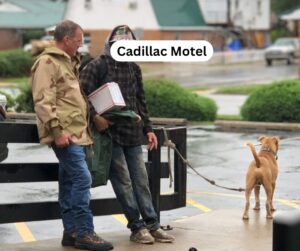
Then, we ran into a man experiencing homelessness, whom we call “Doppler. ” If you’re in the community, you get the pun there. He had been missing from Tent City for a couple of months, and it was a great relief to find him and discover to be told where he was camped out. He was drenched from head to toe, as well as all of his belongings. We fixed him up the best we could with what we had, including a new item that had been added to our arsenal: a hardware kit. It’s simply a box filled with one New Testament, one new tarp, roofing nails, duct tape roll, work gloves, and some batteries. The hope is that this kit will help construct a temporary shelter from the rain. And the batteries, well, everyone experiencing homelessness could use batteries. Thankfully for Doppler, we happened to also have a tote of used work boots, and he found a pair that, according to him, was “perfect.” Along with some used socks from one of our sock totes, and he was better suited to handle the rain.
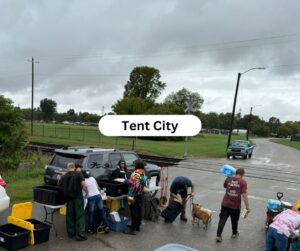
Despite me knocking on every door on the property, we didn’t have the turnout we usually would have had. So, we loaded up and headed to Tent City. Usually, when we arrive at the parking area just up from their camp, several residents will already be there waiting for us. Nobody was there, which wasn’t a big surprise since it had been raining. I traveled down the railroad tracks to the threshold of a couple of communities (camps) and called for them by name. Just for the record, it should be noted here that I would not recommend anyone cross that threshold. That is their home. You or I would not appreciate someone randomly walking into our home unannounced.
About a dozen residents were willing to come out, all soaking wet. Someone had donated a bunch of military fatigues and rain gear by chance. Of course, that disappeared almost instantly. We passed out an abundance of packaged food, especially for them. Although we had plenty to go around at this time, last month, we didn’t have enough for Tent City, which distressed us. Therefore, this time, we were better prepared with cans of tuna, ramen noodles, cereal bars, peanut butter, and many cans and bags of nonperishable food packaged in totes marked “Tent City.” And bottled water, of course.
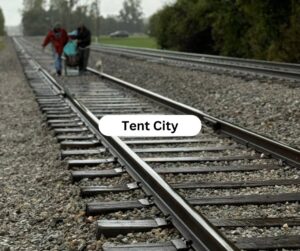 It’s a struggle for them to transport the goods back to their camp. The only reasonable path is along a set of railroad tracks. Usually, a pair will grab each end of a wagon (or whatever might be available) and carry it across the wooden railroad ties to the muddy path leading to their camp. Occasionally, one will be alone and be tasked with dragging what they can down the tracks. We will do our best to help, but honestly, all of our volunteers are older than I am, and there’s a real possibility of injury attempting to lift these loads. I can attest to that myself. We could certainly use some younger, more able-bodied volunteers. I’ve envisioned having an ATV that we could use to transport their goods back to the entrance of their camps, but we do not have those resources. We are grateful that our Heavenly Father has put the people and resources we have in place now. Tom and Karen Bristow and their people from Ridgewood Baptist are as constant as a northern star. It would be an understatement to say it would be very challenging without them.
It’s a struggle for them to transport the goods back to their camp. The only reasonable path is along a set of railroad tracks. Usually, a pair will grab each end of a wagon (or whatever might be available) and carry it across the wooden railroad ties to the muddy path leading to their camp. Occasionally, one will be alone and be tasked with dragging what they can down the tracks. We will do our best to help, but honestly, all of our volunteers are older than I am, and there’s a real possibility of injury attempting to lift these loads. I can attest to that myself. We could certainly use some younger, more able-bodied volunteers. I’ve envisioned having an ATV that we could use to transport their goods back to the entrance of their camps, but we do not have those resources. We are grateful that our Heavenly Father has put the people and resources we have in place now. Tom and Karen Bristow and their people from Ridgewood Baptist are as constant as a northern star. It would be an understatement to say it would be very challenging without them.
We arrived at the Colonel House Motel to an even more diminished number of residents, about ten. Over the last several months, we have noticed more rooms have been bordered up and left in disrepair over each visit. On this visit, I asked the one who seemed to be in charge if they would agree with the statement that the immediate future of this property is uncertain, and they stated that “they hope to be working on it.”
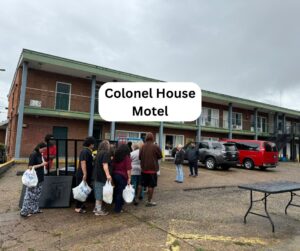 I can’t help but remember them standing there. I was walking past them, having knocked on what few doors remained occupied. They had all lined up, shoulder to shoulder, with a wall of hotel doors to their back. Each of them, holding their bag the same way, open as if waiting to receive something. So, I’ve got to ask, “Are you guys in a line?” The one I thought would be the one in charge humbly explained that they were waiting for permission to see what was in the totes. That just weirdly struck me. People being kind just out of the blue, in places where we ordinarily wouldn’t expect to find it. Maybe since we’re not expecting people to act decent based on where they live, it tells us something about ourselves. Ten years ago, I wouldn’t have stepped foot onto this property. And I think, by default, I still fall short of seeing the best in people.
I can’t help but remember them standing there. I was walking past them, having knocked on what few doors remained occupied. They had all lined up, shoulder to shoulder, with a wall of hotel doors to their back. Each of them, holding their bag the same way, open as if waiting to receive something. So, I’ve got to ask, “Are you guys in a line?” The one I thought would be the one in charge humbly explained that they were waiting for permission to see what was in the totes. That just weirdly struck me. People being kind just out of the blue, in places where we ordinarily wouldn’t expect to find it. Maybe since we’re not expecting people to act decent based on where they live, it tells us something about ourselves. Ten years ago, I wouldn’t have stepped foot onto this property. And I think, by default, I still fall short of seeing the best in people.
Nevertheless, we passed out what we had to the few there. The person living outside in the second-floor breezeway in a sleeping bag was gone, hopefully to a better place to stay.
From there, we visited Dixiana Court apartments, where many Burmese families live. Because these apartments have ovens with stovetops, we can offer food that our other stops cannot prepare, such as dry beans, different kinds of pasta, and condensed soups. We still hand out the food bags and what clothing we have, such as socks and shoes. By now, the rain had subsided, and people were more willing to take advantage of what we had.
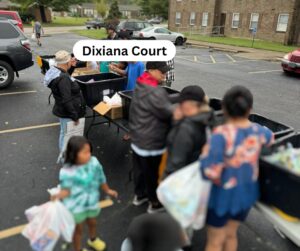 We took about half of the five hundred food bags we had prepared back to our shop, which is extremely rare, but we believe it was directly related to the rain. These bags were stored and will be redeployed during our next outreach on Saturday, October 26th. During this time, we are beginning to collect anything that will keep a human warm, such as coats, gloves, hats, scarves, jackets, hoodies, sweaters, rain gear (etc.). Each year, when it turns cold, we also start to hand these out in addition to the food. With that time quickly closing upon us, we have an excellent collection sorted and stored in totes, ready to deploy.
We took about half of the five hundred food bags we had prepared back to our shop, which is extremely rare, but we believe it was directly related to the rain. These bags were stored and will be redeployed during our next outreach on Saturday, October 26th. During this time, we are beginning to collect anything that will keep a human warm, such as coats, gloves, hats, scarves, jackets, hoodies, sweaters, rain gear (etc.). Each year, when it turns cold, we also start to hand these out in addition to the food. With that time quickly closing upon us, we have an excellent collection sorted and stored in totes, ready to deploy.
Personally, this is one of my favorite times of the year. Don’t get me wrong; it is very rewarding to see someone hungry receive a food bag and eat it right before you. But there’s something special about seeing someone shivering from the cold, and you wrap them up in something warm—especially the children, which is sad since we receive very little for them. To put that into perspective, at the moment that I am writing this, we have about eighty totes of warm clothing, and one of them has coats for kids. And there may be five coats in there.
I’m unsure how much longer we will visit the Colonel House Motel due to their decreased numbers. When we first started going there in 2021, there may have been fifty or so residents, which has now been reduced to ten. Additionally, the number of people at Dixiana Court has diminished, but we believe it is due to different reasons. We suspect that over time, the residents there have learned what we have to offer and no longer desire to partake. From more than one reliable source, we have been told that this community receives the lion’s share of aid and that our resources would be better used in an area that is not eligible for them.
It’s a difficult call. We will pray for guidance and wisdom and trust that the Holy Spirit will show us the way. The management of Lincolnshire Apartments has asked us to start showing up there. That property presents some unique challenges. There are two hundred and nine apartments. If only four people live in each apartment, that’s eight hundred people. Could we come up with that many food bags? If we can do five hundred, what’s a little more, right? Where’s the manpower going to come from? There are only four of us that are guaranteed to show. Six if we’re lucky. It’s hard work and finding people willing to sacrifice their time; well, that’s a whole different matter.
If you would be interested in volunteering, please call me, and I will be delighted to share the details with you. If you want to donate food, any nonperishable item is welcome. Specifically, our food bags will contain one protein, such as a tuna pack, a can of Vienna sausages, or a can of beanie weenies. We also include a pack of oatmeal, ramen noodles, peanut butter, a breakfast bar, a fruit cup or apple sauce, and some form of treat, such as a Little Debbie Snack.
All of the real names used here were with permission. Otherwise, the names have been changed. To protect the identity of those photographed, they have been blurred intentionally unless consent was given before publishing.
The Safer Kentucky Act, which went into effect on July 15, 2024, makes sleeping or camping in public areas illegal, including on sidewalks, roadsides, under bridges, or in parks, parking lots, garages, or doorways. The law creates a new offense called “unlawful camping” that can result in arrest and fines. Assisting those individuals is considered to be aiding and abetting, which is a legal doctrine that refers to the act of helping or encouraging someone to commit a crime. The person who aids and abets is generally held to the same degree of criminal liability as the person who commits the crime. We ask that you please not attempt to locate or visit Tent City.
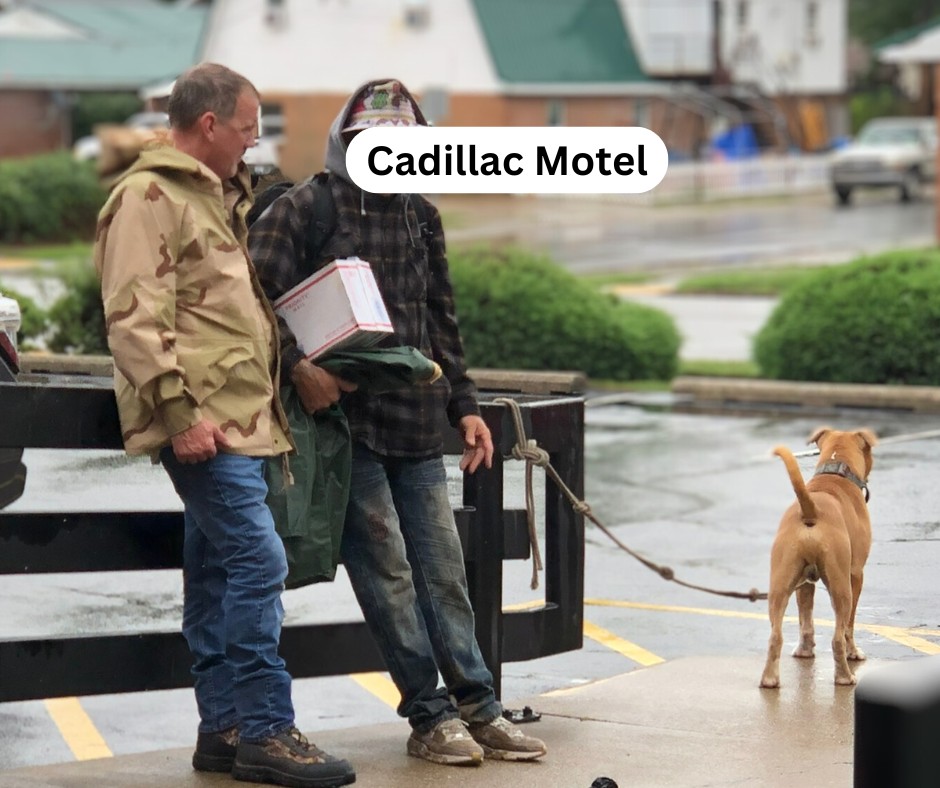


 It’s a struggle for them to transport the goods back to their camp. The only reasonable path is along a set of railroad tracks. Usually, a pair will grab each end of a wagon (or whatever might be available) and carry it across the wooden railroad ties to the muddy path leading to their camp. Occasionally, one will be alone and be tasked with dragging what they can down the tracks. We will do our best to help, but honestly, all of our volunteers are older than I am, and there’s a real possibility of injury attempting to lift these loads. I can attest to that myself. We could certainly use some younger, more able-bodied volunteers. I’ve envisioned having an ATV that we could use to transport their goods back to the entrance of their camps, but we do not have those resources. We are grateful that our Heavenly Father has put the people and resources we have in place now. Tom and Karen Bristow and their people from Ridgewood Baptist are as constant as a northern star. It would be an understatement to say it would be very challenging without them.
It’s a struggle for them to transport the goods back to their camp. The only reasonable path is along a set of railroad tracks. Usually, a pair will grab each end of a wagon (or whatever might be available) and carry it across the wooden railroad ties to the muddy path leading to their camp. Occasionally, one will be alone and be tasked with dragging what they can down the tracks. We will do our best to help, but honestly, all of our volunteers are older than I am, and there’s a real possibility of injury attempting to lift these loads. I can attest to that myself. We could certainly use some younger, more able-bodied volunteers. I’ve envisioned having an ATV that we could use to transport their goods back to the entrance of their camps, but we do not have those resources. We are grateful that our Heavenly Father has put the people and resources we have in place now. Tom and Karen Bristow and their people from Ridgewood Baptist are as constant as a northern star. It would be an understatement to say it would be very challenging without them. I can’t help but remember them standing there. I was walking past them, having knocked on what few doors remained occupied. They had all lined up, shoulder to shoulder, with a wall of hotel doors to their back. Each of them, holding their bag the same way, open as if waiting to receive something. So, I’ve got to ask, “Are you guys in a line?” The one I thought would be the one in charge humbly explained that they were waiting for permission to see what was in the totes. That just weirdly struck me. People being kind just out of the blue, in places where we ordinarily wouldn’t expect to find it. Maybe since we’re not expecting people to act decent based on where they live, it tells us something about ourselves. Ten years ago, I wouldn’t have stepped foot onto this property. And I think, by default, I still fall short of seeing the best in people.
I can’t help but remember them standing there. I was walking past them, having knocked on what few doors remained occupied. They had all lined up, shoulder to shoulder, with a wall of hotel doors to their back. Each of them, holding their bag the same way, open as if waiting to receive something. So, I’ve got to ask, “Are you guys in a line?” The one I thought would be the one in charge humbly explained that they were waiting for permission to see what was in the totes. That just weirdly struck me. People being kind just out of the blue, in places where we ordinarily wouldn’t expect to find it. Maybe since we’re not expecting people to act decent based on where they live, it tells us something about ourselves. Ten years ago, I wouldn’t have stepped foot onto this property. And I think, by default, I still fall short of seeing the best in people. We took about half of the five hundred food bags we had prepared back to our shop, which is extremely rare, but we believe it was directly related to the rain. These bags were stored and will be redeployed during our next outreach on Saturday, October 26th. During this time, we are beginning to collect anything that will keep a human warm, such as coats, gloves, hats, scarves, jackets, hoodies, sweaters, rain gear (etc.). Each year, when it turns cold, we also start to hand these out in addition to the food. With that time quickly closing upon us, we have an excellent collection sorted and stored in totes, ready to deploy.
We took about half of the five hundred food bags we had prepared back to our shop, which is extremely rare, but we believe it was directly related to the rain. These bags were stored and will be redeployed during our next outreach on Saturday, October 26th. During this time, we are beginning to collect anything that will keep a human warm, such as coats, gloves, hats, scarves, jackets, hoodies, sweaters, rain gear (etc.). Each year, when it turns cold, we also start to hand these out in addition to the food. With that time quickly closing upon us, we have an excellent collection sorted and stored in totes, ready to deploy.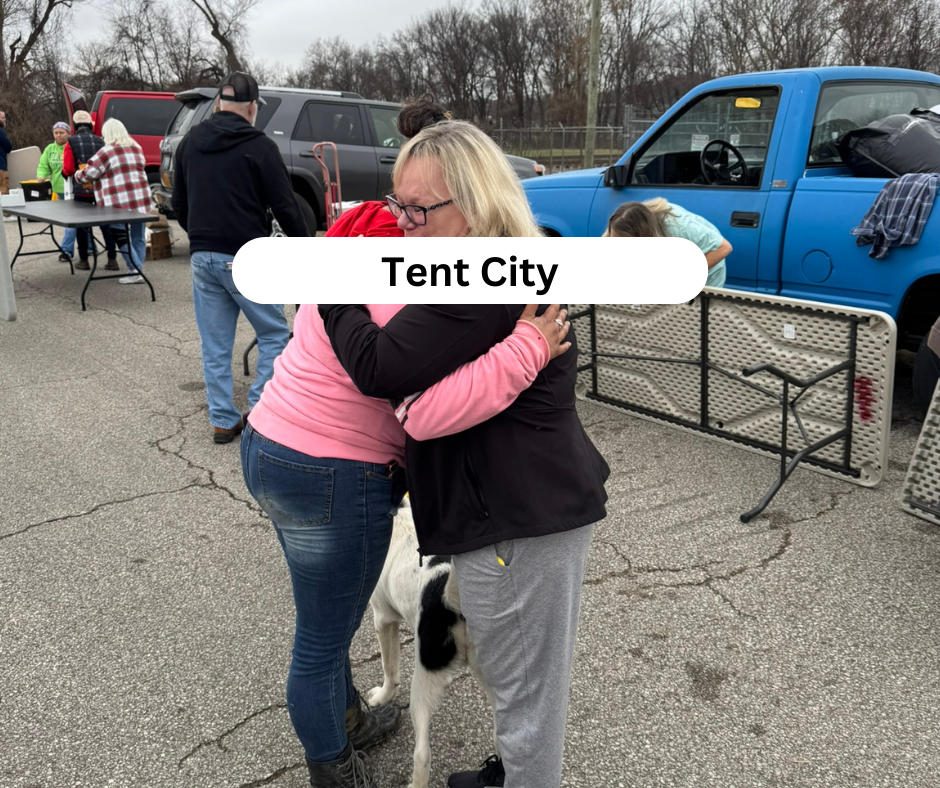
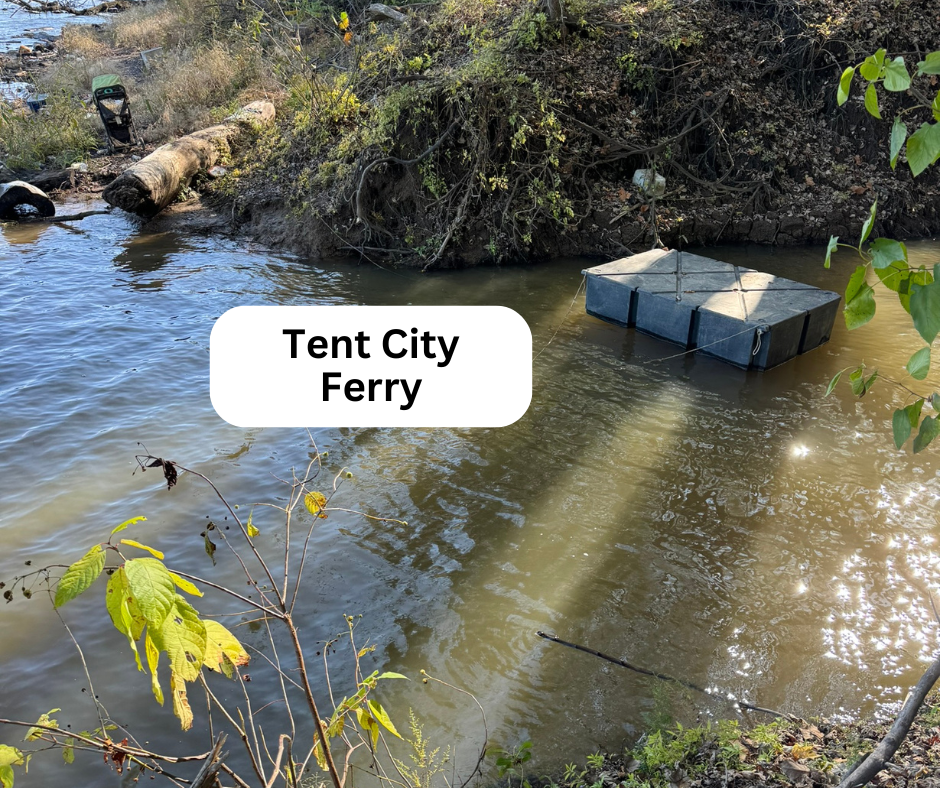
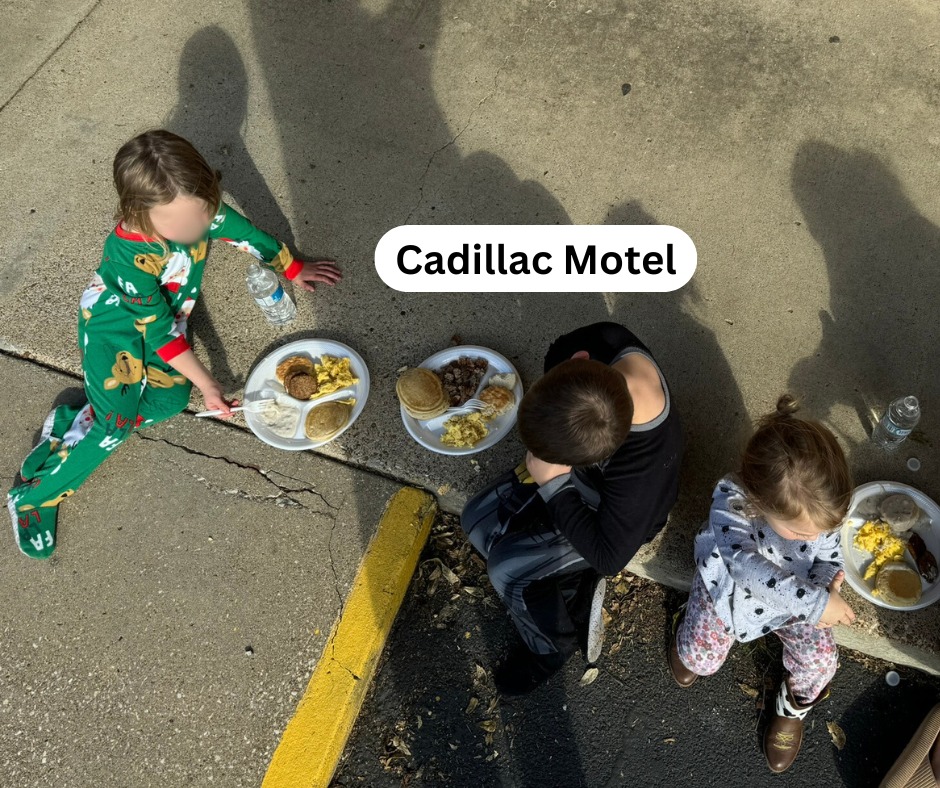
0 Comments